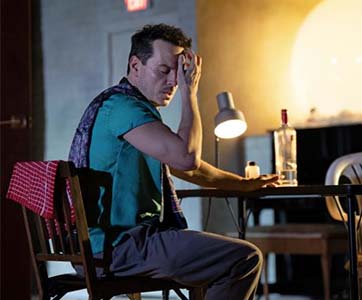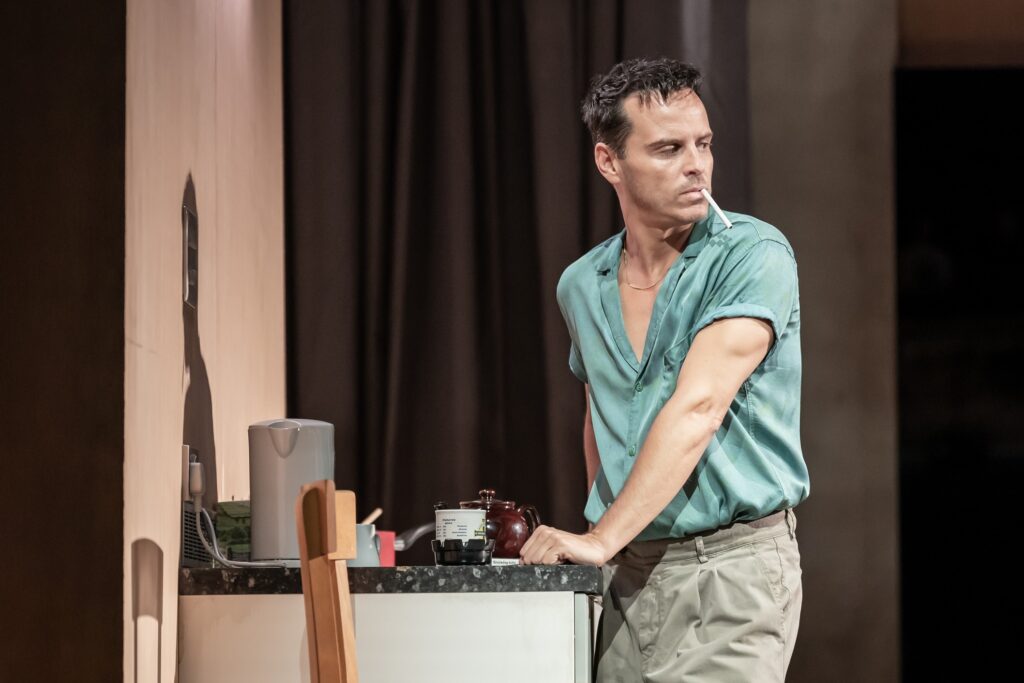By Lucy Komisar
“Vanya” is a gay play imagining the characters of Chekhov’s “Uncle Vanya.” The credit is “After Anton Chekhov,” with co-creators Simon Stephens, Sam Yates (also director) and Rosanna Vize (also designer). So, it uses the name, but it’s not Chekhov’s play. The solo performer is Andrew Scott, who says he is gay, and that is relevant.
In Scott’s performance, the men are somewhat interesting and the women are pseudo females that no real women would ever recognize. An actor’s job is to make a character believable. You do not believe Scott’s women, especially Sonia, a gay man’s parody.
(Quick summary: in Chekhov’s play, Sonia is the daughter of Alexander and his late wife Anna, through whom she inherited the estate she manages with her uncle Vanya. Alexander visiting from town with second wife Helena has survived on profits they send him but now wants to sell the property for cash. (But it’s Sonia’s.) Doctor Michael visits daily to see Helena. Sonia loves Michael, not requited.)

Real women have voices. But Sonia sounds like her vocal cords were cut. She has just a simpering whispering gay imagining of how a woman talks. I am so tired of gay men inventing fake women. For example, “Cage Aux Folles” about a gay guy is great. “Oh, Mary” with a gay guy playing the wife of Lincoln is misogynist and horrible.
This play takes Chekhov’s characters and throws them together in a script that in more than the half of the looong two hours is dreadfully boring. I recognized some of the play’s events, but not the people. That aside from the horrific this is how women talk.
Scott as an actor is admirable in the male roles. And kudos for memorizing two hours of lines in a one-person play.
But start with direction problems. To point out the characters aside from voices, Scott has unhappy Michael the doctor bounce a tennis ball. Really? No reference leads to that. Another male has dark glasses, because? Sonia flits around with a red dish rag. Any male-female stereotypes suggested? Alexander the filmmaker of course has a scarf, a gay touch.
The Vanya character is called Ivan. So you have to know that Vanya is the diminutive. Frankly, with the TV audience laughing at non-funny lines (this is not a comic play), I suspect they did not.
“Uncle Vanya” was published in 1897. In this production the set design by Vize includes modern kitchen appliances. But current time contradicts the story of the play, especially the role of women.
I was sorry the rifle that is mustered at the end was not shown earlier. The famous Chekhov gun principle is if a gun appears in an early act, it has to be used by the end. I’d have liked the reverse (let’s see the rifle earlier) as a hat tip to the master!
What an insult to Chekhov and to women is this play!
(There should be a conversation about critics dealing with gays, since many routinely avoid saying when a play with a gay sensibility abuses women or is otherwise offensive. Are straight critics afraid to speak out? Criticisms and plaudits of this review will be posted here. Except hate messages, already received and deleted.)
“Vanya.” Created by Simon Stephens, Sam Yates (director) and Rosanna Vize (designer). Lucille Lortel Theater, 121 Christopher Street, NYC. Two hours (announced as 90 min but ran 2 hrs). Opened March 17, 2025, closes May 11, 2025.



Vanya is NOT a ‘gay play; as you put it…
As for the rest of this piece, it sounds to me like you haven’t even paid the slightest bit of attention to the play because if you had, you’d actually write a decent piece, and praise it instead of criticising pretty much everything about it.
Quite why anyone would want to donate to this site when there are unfair and poorly written pieces like this on it, is beyond me…
LK: Read the review again. You have to separate your theater criticism from your ideology. This is a gay play because it presents a woman as a gay male parody. No woman talks like Sonia. Or do you think they do? And do you like this putdown of women? Can you support equal rights for gays and at the same time understand when a gay actor in his role is abusive of women? Are gay actors beyond criticism?
I don’t think this play was ever considered a gay play. The directors just happened to find Andrew Scott. Yes, he happens to be gay. But I doubt you would be saying any of this if instead, his understudy (a woman) had done the one-person show instead. I don’t think you would complain about it becoming a lesbian play, and I don’t you think you would be frustrated with random objects (that were chosen entirely randomly) apparently showing misogyny.
LK: Good point. So maybe not the author but Andrew Scott (and the director) turned it into a gay play by his portrayal of Sonia. The script says Alexander wears a scarf. The other objects, including a dishrag for Sonia (they are never random), would have been chosen by the director.
I have to completeley disagree that the portrayal of women in this play is in some way misogynistic or even ‘fake’ or unrecognisable. I’ve seen this play more times than i could count on one hand so perhaps I am biased but I found both Helena and Sonia to be incredibly accurate to the types of women they are representing. Especially Sonia, who i found to be the most fleshed out and quite frankly relatable character in this adaptation, I am especially a fan of the tea towel. I do agree that the tennis ball is an odd choice for Michael but the dishrag is so incredibly clever for Sonia, making nods towards her homemaker personailty and her traditional qualities as she looks after most of the other characters and the estate (as she did in the original Chekhov play). I do also want to add that I did see this in the UK and that since its UK run some changes have been made (such as the scarf which wasn’t part of the show when i saw it). But all in all ill have to disagree with you on this one. This wasn’t a ‘gay’ play and was absolutely in no way misogynistic with the women in this play being some of the most complex and fascinating characters.